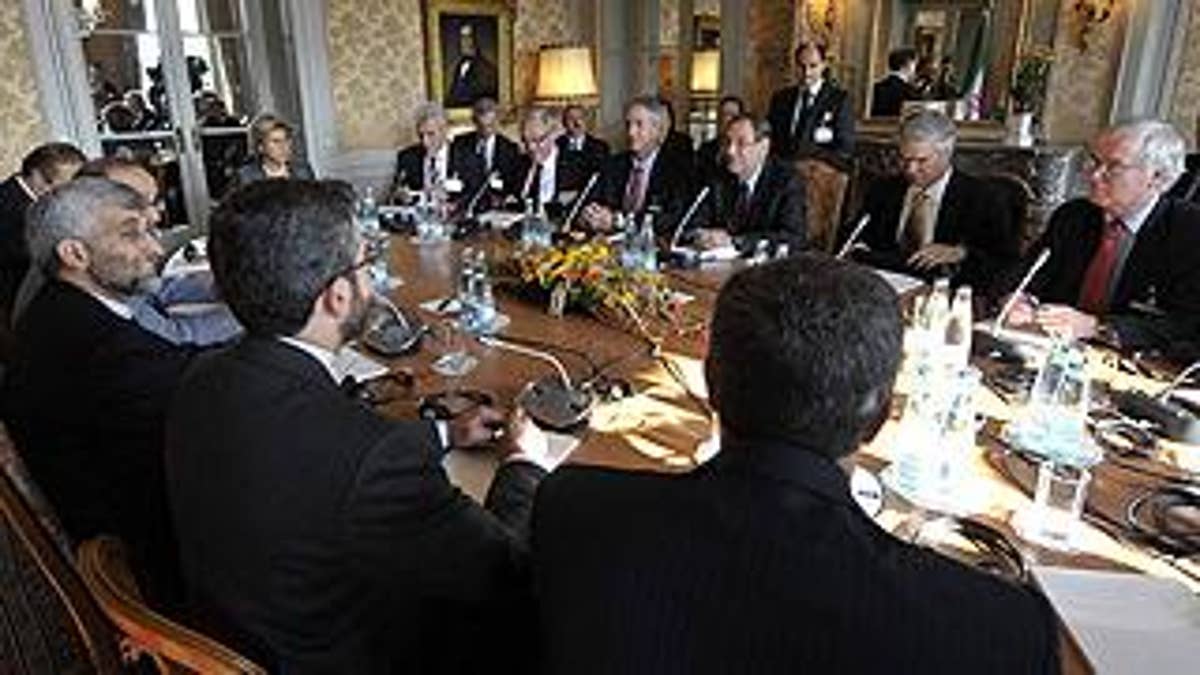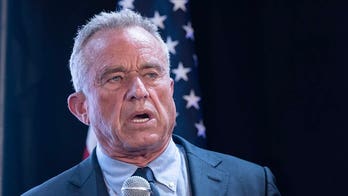
In a key meeting that may determine the future of Iran's nuclear ambitions, the U.S. and five other world powers went to the table with Tehran on Thursday to demand a freeze of its nuclear activities.
As officials arrived in Geneva for talks expected to last eight hours or more, U.S. officials said there probably will be additional meetings but they won't go on indefinitely.
"There's a specific agenda and specific problems that needed to be dealt with and if they're not dealt with responsibly by the Iranians that stronger measures will be developed and implemented to ensure that they do," White House spokesman Robert Gibbs said Wednesday.
But even as they prepared for Thursday's talks, the U.S. and its allies were contemplating new and tighter sanctions on Tehran, in a clear signal of expectations that the negotiations may again end in failure.
Iranian officials have indicated they don't want to talk about their two nuclear enrichment facilities.
Asked about Iran's view of the talks, President Mahmoud Ahmadinejad -- who has repeatedly said uranium enrichment is not up for negotiation -- said he saw them as a "test" of the six powers' respect of Iran's rights.
"A test to measure the extent of sincerity and commitment of some countries to the law and justice," he said.
Secretary of State Hillary Clinton suggested all six -- the five permanent U.N. Security Council members and Germany -- were of one mind on the need for Iran to meet international concerns on its refusal to stop uranium enrichment and heed other U.N. Security Council demands.
"We support what the international community has said with a unified voice," she told reporters at the United Nations.
Iran's choice, she said, is to agree to measures that "would guarantee that what they're doing is solely for peaceful purposes -- and the alternative track, which is greater isolation and international pressure."
With the stakes raised by Tehran's revelation last week of a secret uranium enrichment site, a move by the U.S. to break precedent and meet directly with Iran would reflect the Obama administration's determination to get results at Thursday's gathering.
Briefing reporters in Geneva, a senior U.S. official raised the possibility of a meeting between the Americans, represented by William Burns, the under secretary of state for political affairs, and Iran's chief negotiator Saeed Jalili. He demanded anonymity because of the private nature of the talks.
Such one-on-one negotiations would "offer an opportunity to reinforce the main concerns that we'll be emphasizing in the meeting," the official said.
Aides suggest Obama will decide by the end of the year whether Iran is stonewalling and new sanctions are needed.
The biggest target may be Iran's energy sector but the biggest roadblock may be China.
"Iran is China's second largest supplier of energy," said Peter Brookes of the conservative Heritage Foundation. "China, over the last several years, has invested as much as $100 billion in Iranian energy sector."
Iranian oil is fueling China's economic boom and Chinese investment in Iranian refineries has sharply reduced the country's need to import gasoline, making the country less vulnerable to an embargo.
Brookes says it’s a dilemma for Beijing.
"They don't want Iran really to have nuclear weapons because it would trouble international security," Brookes said. "But China has other stakes in Iran as well and they really don't want to do the heavy lifting in terms of being the bad guy."
And some experts feel that may leave on the military option which U.S. officials have said only buys time.
Former UN Ambassador John Bolton says it would likely be up to the Israelies.
"I think it's very risky, it's a very unattractive alternative," he said. "But when you consider the only other thing that may be left out there is nuclear Iran, I think that's why the Israelis are giving it very serious consideration."
On Wednesday, Iran's foreign minister, Manouchehr Mottaki, made an unusual visit to Washington after being granted a visa with striking speed by the State Department. The U.S. and Iran have not had formal diplomatic relations since the 1980 Iranian revolution.
State Department spokesman P.J. Crowley played down the significance of the U.S. move, saying Mottaki visited a Pakistani government office that represents Iranian interests in Washington and had no meetings with U.S. officials.
With Russia and China resisting previous calls for additional U.N. sanctions on Iran, the potential loomed for new East-West disagreement if Thursday's negotiations ended without progress. U.N. sanctions must be approved by all five of the permanent Security Council members.
Since Iran's secret enrichment program was revealed seven years ago, the Tehran government has shrugged off three sets of Security Council resolutions imposing sanctions meant to punish it for continuing to enrich. It has set up more than 8,000 centrifuges at its cavernous underground facility at Natanz, with the majority of them churning out enriched uranium.
The centrifuges are producing low-enriched uranium, which Tehran insists it needs for a planned network of nuclear reactors. But the U.S., Israel and others fear it could reconfigure the Natanz plant to produce weapons-grade uranium for warheads -- or start making it at a secret facility.
Iran's Sept. 21 disclosure to the International Atomic Energy Agency that it has covertly built a second enrichment plant has strengthened such concerns.
If Thursday's talks fail, the U.S. and its Western allies will renew their push for a fourth set of U.N. Security Council sanctions, officials from two of the delegations said.
Russia has spoken more harshly about Iran's nuclear defiance since Obama canceled plans two weeks ago to set up a missile system in Eastern Europe that the Kremlin viewed as a threat.
But Russian officials have been careful to avoid the word "sanctions" ahead of the talks. China, which appears most opposed to new U.N. sanctions on Tehran, is sending a relatively low-level representative to the talks.
Washington, London, Paris and Berlin are keen to maintain at least outward unity with Moscow and Beijing on dealing with Iran. But the officials -- who discussed confidential Iran strategy only on condition of anonymity -- said the four Western countries are ready to go ahead without Russia and China if they again block new U.N. sanctions out of economic or political considerations.
They said discussions have already begun on tightening existing U.N. and European Union sanctions and enacting new ones. "Our approach will be that if we cannot get something in the Security Council, we will not wait but will be certainly actively looking for other measures," a senior official from one of the six powers said.
FOX News’ Wendell Goler and The Associated Press contributed to this report.




